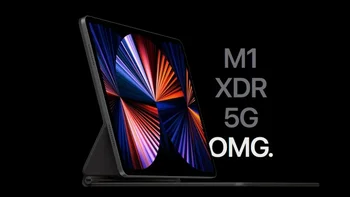M1 iPad Pro is over 50% faster than predecessor, also beats Intel MacBook Pro in benchmarks

The new M1-powered 12.9-inches iPad Pro is nearly 56 percent faster than the last generation model, according to benchmark scores spotted by MacRumors.
Apple’s eight-core M1 processor has been fueling Macs since last fall. During the Spring Loaded event where the 2021 iPad Pro was announced, the company said that the chip has made the latest slate up to 50 percent faster than the previous model.
According to five seemingly legitimate results on Geekbench 5, the fifth-generation 12.9-inch iPad Pro boasts average single-core and multi-core scores of 1,718 and 7,284, respectively. The M1 MacBook Air has netted comparable scores (average single-core and multi-core scores of 1,701 and 7,378, respectively).
The fourth-generation 12.9-inch iPad Pro which has the A12Z chipset under the hood has average single-core and multi-core results of 1,121 and 4,656, respectively. The new tablet has also outdone the highest-end Intel Core i9-powered 16-inch MacBook Pro which got average single-core and multi-core scores of 1,091 and 6,845 respectively.
Per Apple's claim, its latest slate's 8-core GPU offers a 40 percent performance bump over the A12Z Bionic and it turns out, the company was being incredibly humble. The M1 iPad Pro has an average Metal score of 20,578 at the moment, which is a 71 percent increase over the A12Z-fueled iPad Pro. It's around the same as M1 Macs' graphics performance.
The M1 iPad Pros haven't started shipping yet and so, it remains to be seen how these results will translate into real-world performance. Also, although the iPad Pro now has the same processor as the latest MacBook Air, MacBook Pro, Mac mini, and iMac, there are concerns that iPadOS will not be able to leverage the chip's full capabilities.
The new devices will allegedly be released on May 21 and the first reviews could arrive a couple of days before that.
Other headlining features include a Liquid Retina XDR display that incorporates mini-LEDs for brighter colors and more details (exclusive to the 12.9-inch model), Thunderbolt 3 support, an updated camera system, optional 5G connectivity, and up to 2TB of storage and 16GB of RAM.
Apple’s eight-core M1 processor has been fueling Macs since last fall. During the Spring Loaded event where the 2021 iPad Pro was announced, the company said that the chip has made the latest slate up to 50 percent faster than the previous model.
According to five seemingly legitimate results on Geekbench 5, the fifth-generation 12.9-inch iPad Pro boasts average single-core and multi-core scores of 1,718 and 7,284, respectively. The M1 MacBook Air has netted comparable scores (average single-core and multi-core scores of 1,701 and 7,378, respectively).
Per Apple's claim, its latest slate's 8-core GPU offers a 40 percent performance bump over the A12Z Bionic and it turns out, the company was being incredibly humble. The M1 iPad Pro has an average Metal score of 20,578 at the moment, which is a 71 percent increase over the A12Z-fueled iPad Pro. It's around the same as M1 Macs' graphics performance.
M1 iPad Pro vs A12Z iPad Pro vs M1 MacBook Air vs Intel Core i9 MacBook Pro average single-core and multi-core benchmark results at a glance
- M1 12.9-inch iPad Pro: 1,718 and 7,284
- A12Z 12.9-inch iPad Pro: 1,121 and 4,656
- M1 MacBook Air: 1,701 and 7,378
- Intel Core i9 16-inch MacBook Pro: 1,091 and 6,845
iPadOS might not be able to take full advantage of iPad Pro's M1 chip
The M1 iPad Pros haven't started shipping yet and so, it remains to be seen how these results will translate into real-world performance. Also, although the iPad Pro now has the same processor as the latest MacBook Air, MacBook Pro, Mac mini, and iMac, there are concerns that iPadOS will not be able to leverage the chip's full capabilities.
The new devices will allegedly be released on May 21 and the first reviews could arrive a couple of days before that.
Other headlining features include a Liquid Retina XDR display that incorporates mini-LEDs for brighter colors and more details (exclusive to the 12.9-inch model), Thunderbolt 3 support, an updated camera system, optional 5G connectivity, and up to 2TB of storage and 16GB of RAM.










Things that are NOT allowed: